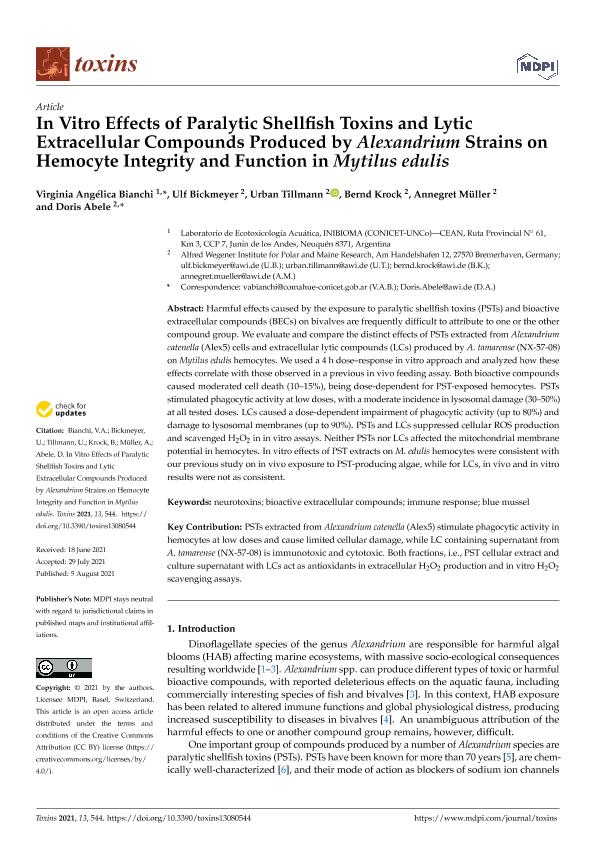Artículo
In vitro effects of paralytic shellfish toxins and lytic extracellular compounds produced by alexandrium strains on hemocyte integrity and function in mytilus edulis
Bianchi, Virginia Angélica ; Bickmeyer, Ulf; Tillmann, Urban; Krock, Bernd; Müller, Annegret; Abele, Doris
; Bickmeyer, Ulf; Tillmann, Urban; Krock, Bernd; Müller, Annegret; Abele, Doris
 ; Bickmeyer, Ulf; Tillmann, Urban; Krock, Bernd; Müller, Annegret; Abele, Doris
; Bickmeyer, Ulf; Tillmann, Urban; Krock, Bernd; Müller, Annegret; Abele, Doris
Fecha de publicación:
08/2021
Editorial:
Multidisciplinary Digital Publishing Institute
Revista:
Toxins
e-ISSN:
2072-6651
Idioma:
Inglés
Tipo de recurso:
Artículo publicado
Clasificación temática:
Resumen
Harmful effects caused by the exposure to paralytic shellfish toxins (PSTs) and bioactive extracellular compounds (BECs) on bivalves are frequently difficult to attribute to one or the other compound group. We evaluate and compare the distinct effects of PSTs extracted from Alexandrium catenella (Alex5) cells and extracellular lytic compounds (LCs) produced by A. tamarense (NX-57-08) on Mytilus edulis hemocytes. We used a 4 h dose–response in vitro approach and analyzed how these effects correlate with those observed in a previous in vivo feeding assay. Both bioactive compounds caused moderated cell death (10–15%), being dose-dependent for PST-exposed hemocytes. PSTs stimulated phagocytic activity at low doses, with a moderate incidence in lysosomal damage (30–50%) at all tested doses. LCs caused a dose-dependent impairment of phagocytic activity (up to 80%) and damage to lysosomal membranes (up to 90%). PSTs and LCs suppressed cellular ROS production and scavenged H2O2 in in vitro assays. Neither PSTs nor LCs affected the mitochondrial membrane potential in hemocytes. In vitro effects of PST extracts on M. edulis hemocytes were consistent with our previous study on in vivo exposure to PST-producing algae, while for LCs, in vivo and in vitro results were not as consistent.
Palabras clave:
BIOACTIVE EXTRACELLULAR COMPOUNDS
,
BLUE MUSSEL
,
IMMUNE RESPONSE
,
NEUROTOXINS
Archivos asociados
Licencia
Identificadores
Colecciones
Articulos(INIBIOMA)
Articulos de INST. DE INVEST.EN BIODIVERSIDAD Y MEDIOAMBIENTE
Articulos de INST. DE INVEST.EN BIODIVERSIDAD Y MEDIOAMBIENTE
Citación
Bianchi, Virginia Angélica; Bickmeyer, Ulf; Tillmann, Urban; Krock, Bernd; Müller, Annegret; et al.; In vitro effects of paralytic shellfish toxins and lytic extracellular compounds produced by alexandrium strains on hemocyte integrity and function in mytilus edulis; Multidisciplinary Digital Publishing Institute; Toxins; 13; 8; 8-2021; 1-18
Compartir
Altmétricas



